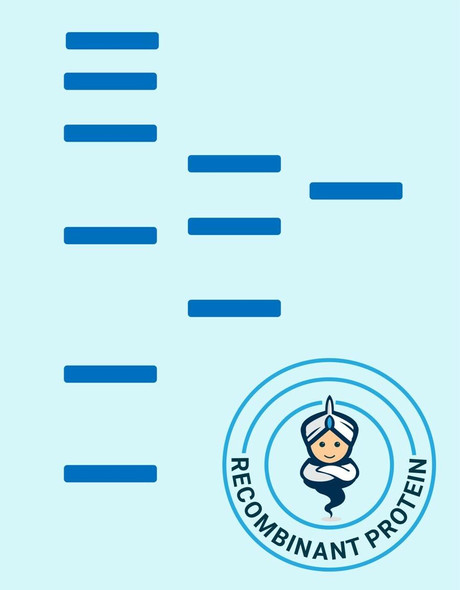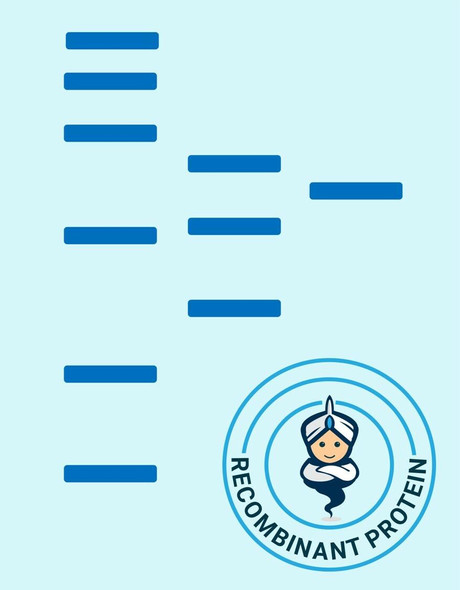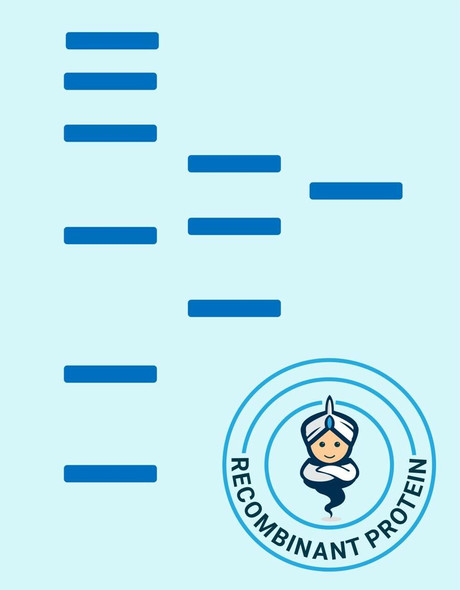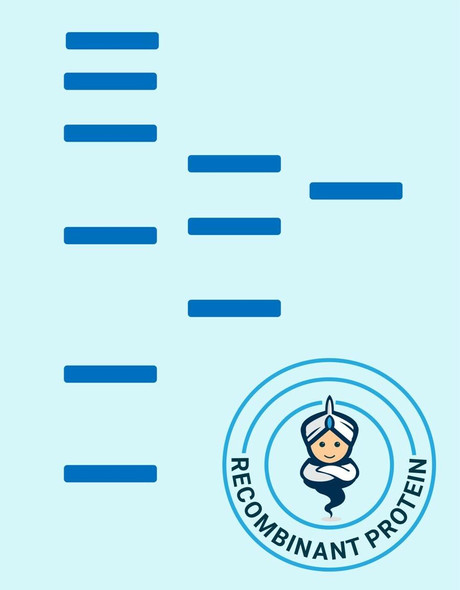Description
| Product Name: | Human PRKACB Recombinant Protein |
| Product Code: | RPPB2633 |
| Size: | 20µg |
| Species: | Human |
| Target: | PRKACB |
| Synonyms: | Protein Kinase CAMP-Dependent Catalytic Beta, PKA C-Beta, EC 2.7.11.11, PKACB, CAMP-Dependent Protein Kinase Catalytic Beta Subunit Isoform 4ab, CAMP-Dependent Protein Kinase Catalytic Subunit Beta, Protein Kinase A Catalytic Subunit Beta, EC 2.7.11, PRKACB. |
| Source: | Escherichia Coli |
| Physical Appearance: | Sterile Filtered colorless solution. |
| Formulation: | The PRKACB solution (1mg/ml) contains 20mM Tris-HCl buffer (pH 8.0), 0.4M Urea and 10% glycerol. |
| Stability: | Store at 4°C if entire vial will be used within 2-4 weeks. Store, frozen at -20°C for longer periods of time. For long term storage it is recommended to add a carrier protein (0.1% HSA or BSA).Avoid multiple freeze-thaw cycles. |
| Purity: | Greater than 80.0% as determined by SDS-PAGE. |
| Amino Acid Sequence: | MGSSHHHHHH SSGLVPRGSH MGSMAAYREP PCNQYTGTTT ALQKLEGFAS RLFHRHSKGT AHDQKTALEN DSLHFSEHTA LWDRSMKEFL AKAKEDFLKK WENPTQNNAG LEDFERKKTL GTGSFGRVML VKHKATEQYY AMKILDKQKV VKLKQIEHTL NEKRILQAVN FPFLVRLEYA FKDNSNLYMV MEYVPGGEMF SHLRRIGRFS EPHARFYAAQ IVLTFEYLHS LDLIYRDLKP ENLLIDHQGY IQVTDFGFAK RVKGRTWTLC GTPEYLAPEI ILSKGYNKAV DWWALGVLIY EMAAGYPPFF ADQPIQIYEK IVSGKVRFPS HFSSDLKDLL RNLLQVDLTK RFGNLKNGVS DIKTHKWFAT TDWIAIYQRK VEAPFIPKFR GSGDTSNFDD YEEEDIRVSI TEKCAKEFGE F |
Protein Kinase CAMP-Dependent Catalytic Beta (PRKACB) belongs to the Ser/Thr protein kinase family and is a catalytic subunit of cAMP-dependent protein kinase. cAMP is a signaling molecule imperative for various cellular functions. cAMP activates the cAMP-dependent protein kinase, which transduces the signal by way of phosphorylation of different target proteins. The inactive kinase holoenzyme is a tetramer composed of 2 regulatory and 2 catalytic subunits. cAMP triggers the dissociation of the inactive holoenzyme into a dimer of regulatory subunits bound to 4 cAMP and 2 free monomeric catalytic subunits. PRKACB mediates cAMP-dependent signaling initiated by receptor binding to GPCRs. PKA activation regulates various cellular processes such as cell proliferation, the cell cycle, differentiation and regulation of microtubule dynamics, chromatin condensation and decondensation, nuclear envelope disassembly and reassembly, in addition to regulation of intracellular transport mechanisms and ion flux. PRKACB regulates the abundance of compartmentalized pools of its regulatory subunits via phosphorylation of PJA2 which binds and ubiquitinates these subunits, leading to their consequent proteolysis.
PRKACB Human Recombinant produced in E.coli is a single, non-glycosylated polypeptide chain containing 421 amino acids (1-398) and having a molecular mass of 48.6kDa. PRKACB is fused to a 23 amino acid His-tag at N-terminus & purified by proprietary chromatographic techniques.
| UniProt Protein Function: | PKACB: Mediates cAMP-dependent signaling triggered by receptor binding to GPCRs. PKA activation regulates diverse cellular processes such as cell proliferation, the cell cycle, differentiation and regulation of microtubule dynamics, chromatin condensation and decondensation, nuclear envelope disassembly and reassembly, as well as regulation of intracellular transport mechanisms and ion flux. Regulates the abundance of compartmentalized pools of its regulatory subunits through phosphorylation of PJA2 which binds and ubiquitinates these subunits, leading to their subsequent proteolysis. A number of inactive tetrameric holoenzymes are produced by the combination of homo- or heterodimers of the different regulatory subunits associated with two catalytic subunits. cAMP causes the dissociation of the inactive holoenzyme into a dimer of regulatory subunits bound to four cAMP and two free monomeric catalytic subunits. The cAMP-dependent protein kinase catalytic subunit binds PJA2. Isoform 1 is most abundant in the brain, with low level expression in kidney. Isoform 2 is predominantly expressed in thymus, spleen and kidney. Isoform 3 and isoform 4 are only expressed in the brain. Activated by cAMP. Belongs to the protein kinase superfamily. AGC Ser/Thr protein kinase family. cAMP subfamily. 9 isoforms of the human protein are produced by alternative splicing. |
| UniProt Protein Details: | Protein type:Protein kinase, Ser/Thr (non-receptor); Kinase, protein; Protein kinase, AGC; EC 2.7.11.11; AGC group; PKA family Chromosomal Location of Human Ortholog: 1p31.1 Cellular Component: nucleoplasm; centrosome; perinuclear region of cytoplasm; plasma membrane; cytosol; cAMP-dependent protein kinase complex Molecular Function:protein binding; cAMP-dependent protein kinase activity; ubiquitin protein ligase binding; magnesium ion binding; ATP binding Biological Process: epidermal growth factor receptor signaling pathway; fibroblast growth factor receptor signaling pathway; nerve growth factor receptor signaling pathway; water transport; activation of protein kinase A; glucose metabolic process; pathogenesis; negative regulation of meiotic cell cycle; signal transduction; protein amino acid phosphorylation; gluconeogenesis; G-protein signaling, coupled to cAMP nucleotide second messenger; synaptic transmission; phospholipase C activation; triacylglycerol catabolic process; carbohydrate metabolic process; neural tube closure; energy reserve metabolic process; renal water homeostasis; innate immune response; blood coagulation; transmembrane transport; regulation of insulin secretion |
| NCBI Summary: | The protein encoded by this gene is a member of the serine/threonine protein kinase family. The encoded protein is a catalytic subunit of cAMP (cyclic AMP)-dependent protein kinase, which mediates signalling though cAMP. cAMP signaling is important to a number of processes, including cell proliferaton and differentiation. Multiple alternatively spliced transcript variants encoding distinct isoforms have been observed. [provided by RefSeq, Jul 2014] |
| UniProt Code: | P22694 |
| NCBI GenInfo Identifier: | 125210 |
| NCBI Gene ID: | 5567 |
| NCBI Accession: | P22694.2 |
| UniProt Secondary Accession: | P22694,Q14VH1, Q59GC0, Q5BNE9, Q5BNF0, Q5BNF1, Q5BNF2 Q5BNF3, Q5CZ92, B1APG4, B4DKB0, B4E2Q1, |
| UniProt Related Accession: | P22694 |
| Molecular Weight: | 37,110 Da |
| NCBI Full Name: | cAMP-dependent protein kinase catalytic subunit beta |
| NCBI Synonym Full Names: | protein kinase, cAMP-dependent, catalytic, beta |
| NCBI Official Symbol: | PRKACB�� |
| NCBI Official Synonym Symbols: | PKACB; PKA C-beta�� |
| NCBI Protein Information: | cAMP-dependent protein kinase catalytic subunit beta; protein kinase A catalytic subunit beta; cAMP-dependent protein kinase catalytic beta subunit isoform 4ab |
| UniProt Protein Name: | cAMP-dependent protein kinase catalytic subunit beta |
| Protein Family: | cAMP-dependent protein kinase |
| UniProt Gene Name: | PRKACB�� |
| UniProt Entry Name: | KAPCB_HUMAN |







